Key takeaways:
- Transitioning to a plant-based diet increased energy levels and emotional well-being, leading to a more stable mood and reduced stress.
- The diet presents significant nutritional benefits, including essential vitamins, high fiber content, and ample plant-based protein from sources like beans and lentils.
- Adopting a plant-based lifestyle contributes positively to environmental sustainability and can lead to economic advantages, such as lower grocery bills and reduced healthcare costs.
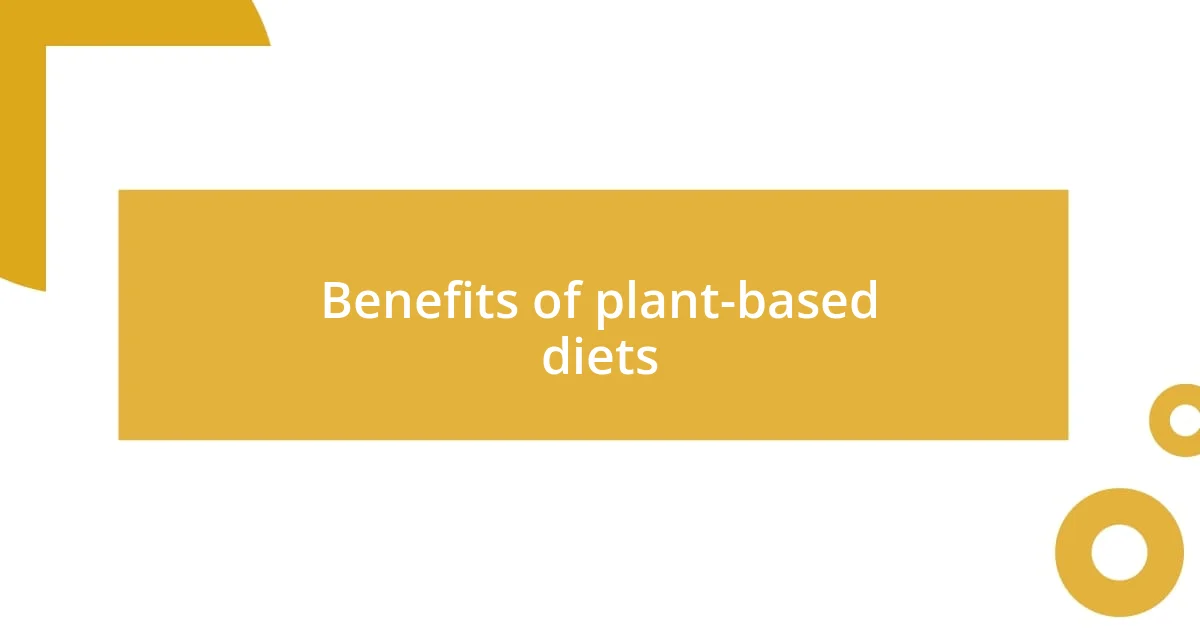
Benefits of plant-based diets
One of the most striking benefits I’ve noticed from adopting a plant-based diet is the boost in my energy levels. Initially, I was skeptical—how could giving up my usual meals lead to feeling more energized? Yet, after a few weeks of focusing on fruits, vegetables, and whole grains, I felt lighter and more vibrant, as if I had shed not just physical weight but also a mental fog.
I also appreciate the impact of plant-based eating on my emotional well-being. Have you ever experienced a mood shift after a particularly heavy meal? I have. When I switched to lighter, plant-based meals, I noticed my mood became more stable, and my stress levels diminished. It’s fascinating how food can influence not just physical health but also emotional resilience.
Moreover, I find the global and environmental implications of plant-based diets incredibly compelling. It hit me hard one day while watching a documentary about climate change—the connection between our food choices and the planet’s health became crystal clear. Knowing that shifting towards a diet rich in plants can significantly reduce my carbon footprint fills me with a sense of purpose and responsibility. Isn’t it empowering to know that our plates can be a source of positive change?
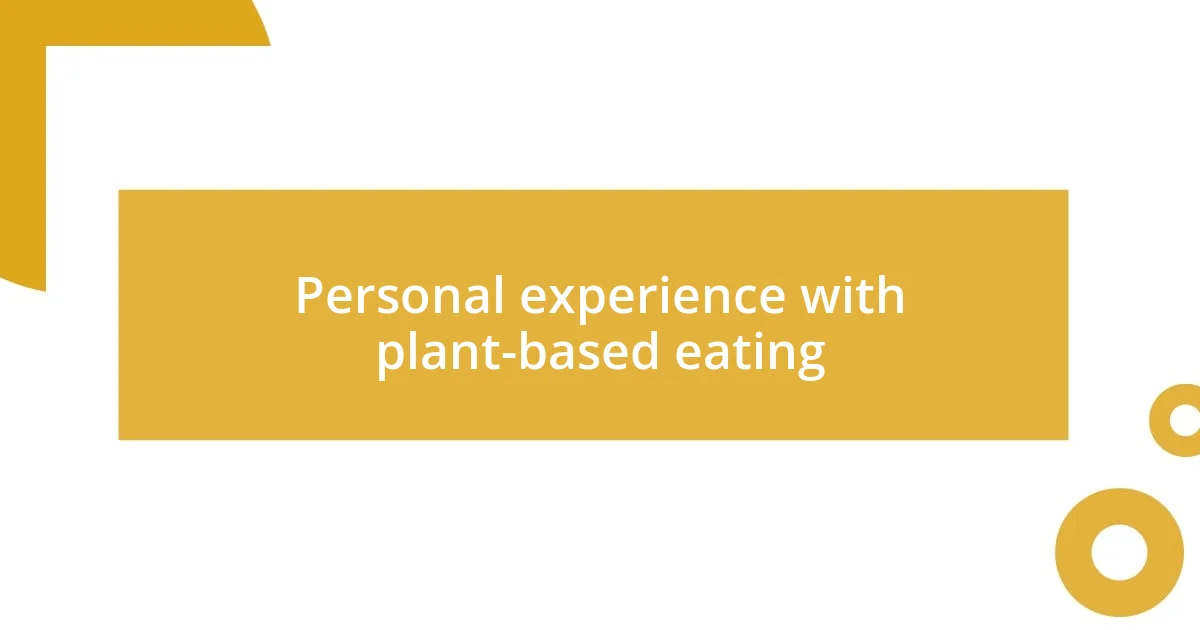
Personal experience with plant-based eating
Switching to a plant-based diet has genuinely transformed my relationship with food. I remember one sunny afternoon when I tried my first-ever smoothie bowl, filled with vibrant fruits and topped with crunchy nuts. The colors alone made me feel excited about eating, and taking those first few bites didn’t just satisfy my hunger; it sparked joy. I felt a deep sense of connectivity not just to what I was eating, but to the earth itself, which was quite an enlightening experience.
- Experiencing spontaneous creativity in meal prep—mixing ingredients I never thought would work together.
- Feeling a sense of pride when preparing a meal that aligns with my values for animal welfare and sustainability.
- Noticing my cravings shifting from processed snacks to fresh fruits and nuts, which has been a delightful surprise.
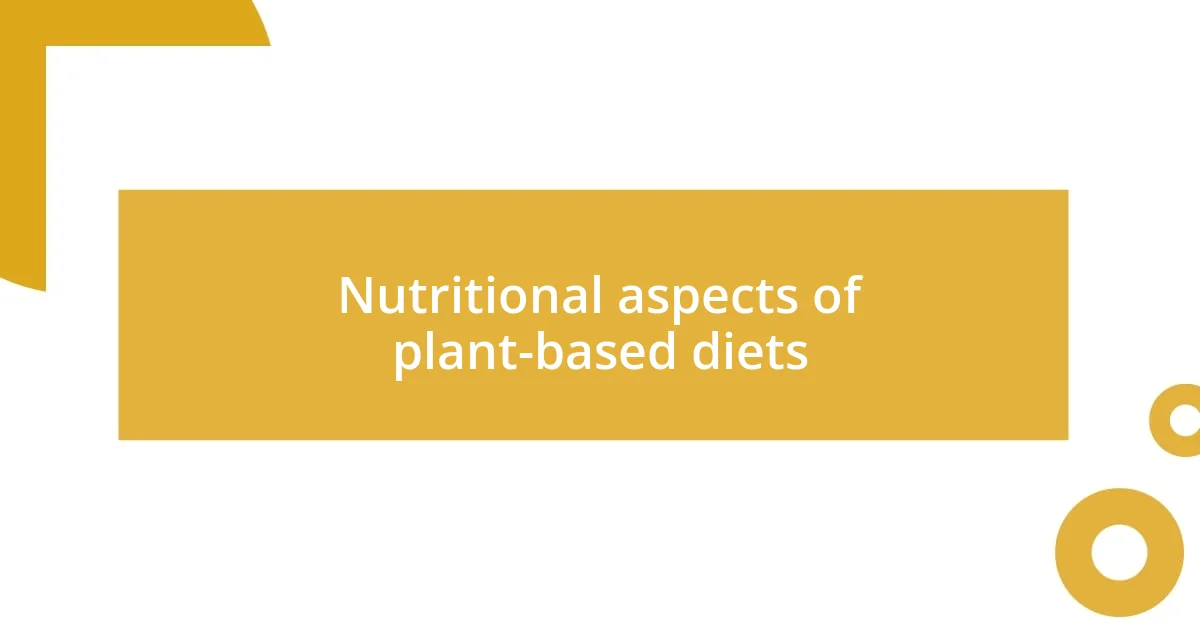
Nutritional aspects of plant-based diets
When it comes to the nutritional aspects of a plant-based diet, I’ve found that it’s rich in essential vitamins and minerals. After a few months of focused eating, I noticed my skin looked clearer, and my hair felt healthier. It’s remarkable how much the right nutrition can show up externally, reflecting what we’ve put into our bodies. For instance, my increased intake of leafy greens packed with vitamins A, C, and K has noticeably improved my overall health.
One standout feature of plant-based eating is its high fiber content. I previously underestimated how crucial fiber is to digestive health. Since incorporating more whole grains and legumes, my digestive system seems to work more smoothly—it’s as if everything is in sync again. And let’s not forget the energy levels; the sustained energy I get from complex carbohydrates has been a game changer for my daily activities.
It’s also worth noting the protein sources that exist within a plant-based framework. Contrary to what I once believed, I discovered that beans, lentils, and quinoa can provide ample protein. Once, I experimented with a lentil stew that made me realize just how satisfying plant-based protein can be. It filled me up and left me feeling good about my choices, reinforcing the idea that a balanced diet can easily meet all our dietary needs.
| Nutrient | Plant-Based Sources |
|---|---|
| Vitamins | Fruits, vegetables, nuts, seeds. |
| Fiber | Whole grains, legumes, fruits, vegetables. |
| Protein | Beans, lentils, tofu, quinoa. |
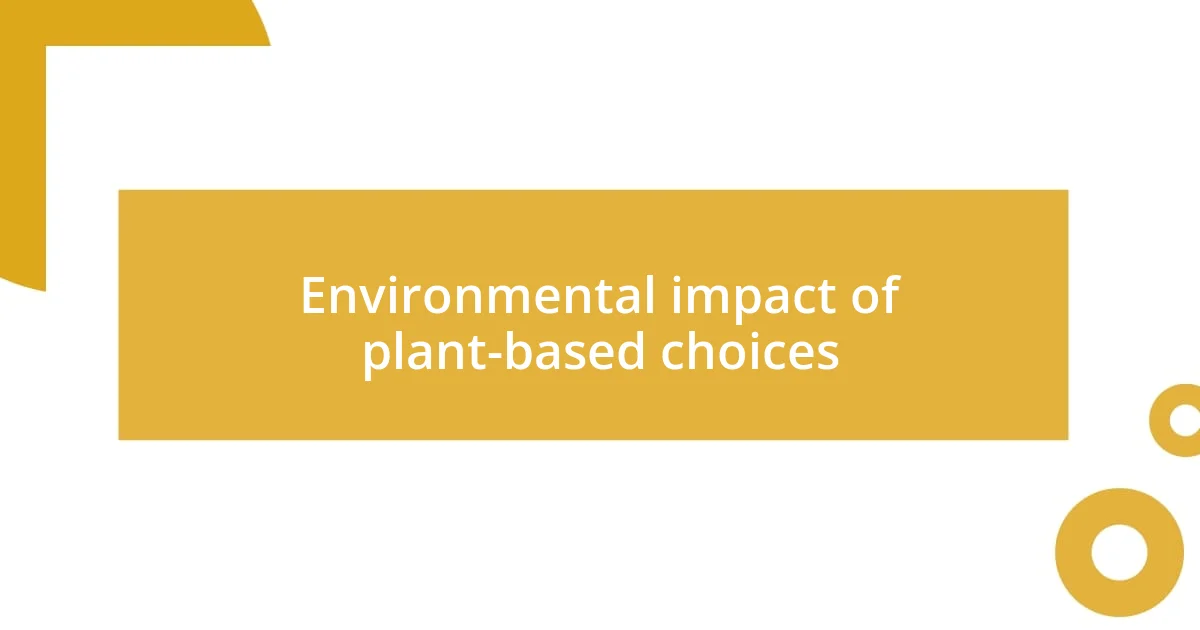
Environmental impact of plant-based choices
Choosing a plant-based diet isn’t just about personal health; it has a profound environmental impact that resonates on a global scale. I remember reading a statistic that really struck me: shifting towards plant-based foods can reduce your carbon footprint significantly. Just thinking about how my meal choices could contribute to less greenhouse gas emissions filled me with a sense of purpose. It’s empowering to realize that by opting for more fruits and vegetables, I can play a part in combating climate change.
Another intriguing aspect is the reduction of land and water usage. When I learned that livestock farming consumes an extraordinary amount of water compared to growing crops, it became clear to me why embracing plant-based meals is essential. For example, producing a pound of beef requires about 1,800 gallons of water, while a pound of vegetables can use just 39 gallons. This fact made me reflect on how my dietary choices could support more sustainable water usage. It’s a powerful realization that my everyday meals could help conserve precious resources.
Furthermore, I often find myself feeling a connection to nature when I choose plant-based ingredients. It’s not just about the food; it’s almost like I’m making a tiny yet impactful gesture toward environmental stewardship with each meal. Have you ever considered how your dinner plate might affect biodiversity? Eating less meat and more plants can help preserve natural habitats—from forests to oceans—by lessening the demand for resource-intensive farming practices. I’ve found this idea invigorating; it aligns perfectly with my desire to live in harmony with our planet.
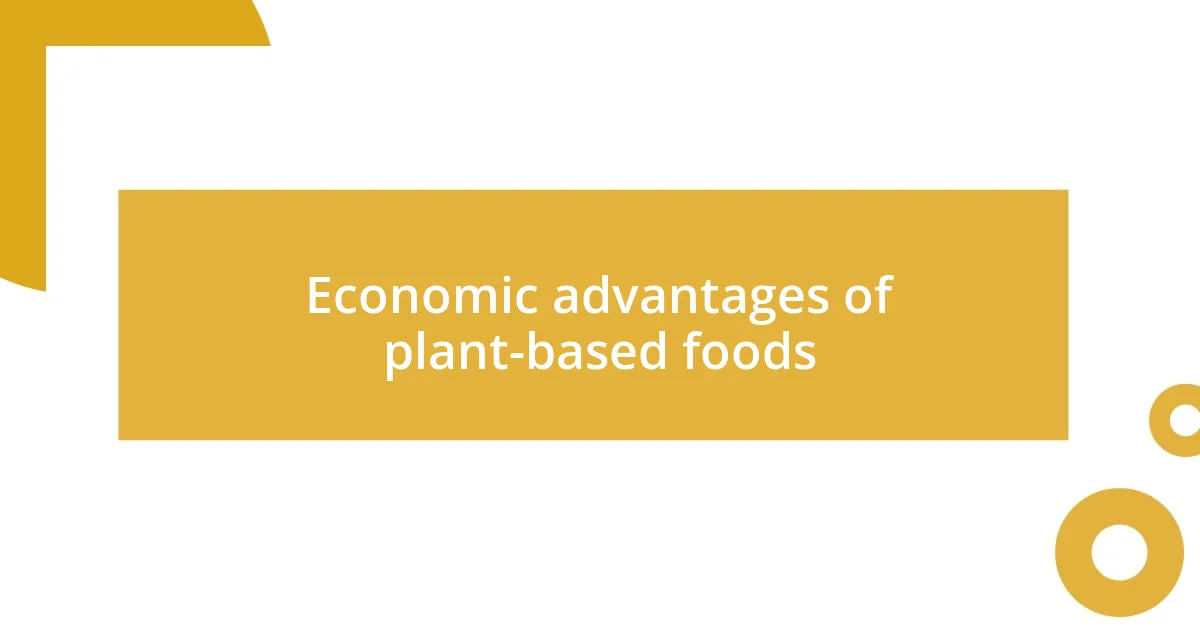
Economic advantages of plant-based foods
Plant-based foods offer some intriguing economic advantages that are hard to overlook. For instance, I remember when I started transitioning to a plant-based diet; my grocery bill surprisingly decreased. Whole grains, beans, and seasonal vegetables are often more affordable than meat and dairy products. This change not only filled my pantry with nutritious options but also allowed me to stretch my budget further, letting me experiment with a variety of recipes.
Another point I’d like to highlight is food waste. In my experience, plant-based ingredients tend to be less perishable than meat, which often spoils quickly and can lead to more waste. I used to find myself tossing out leftover chicken or beef regularly, but since switching to beans and grains, I’ve learned to be more resourceful, making delicious meals from everything. It’s a win-win situation—keeping grocery costs down while making the most of what I buy.
Lastly, consider the healthcare cost implications of a plant-based diet. Healthier eating habits can lead to lower health expenses in the long run. My personal journey has seen fewer doctor visits and reduced medical bills; vibrant health has become my greatest asset. How many people realize that investing in our food choices today could result in savings on healthcare in the future? It’s a perspective shift but a valuable one, as we consider not just the cost of food, but the cost of our well-being.
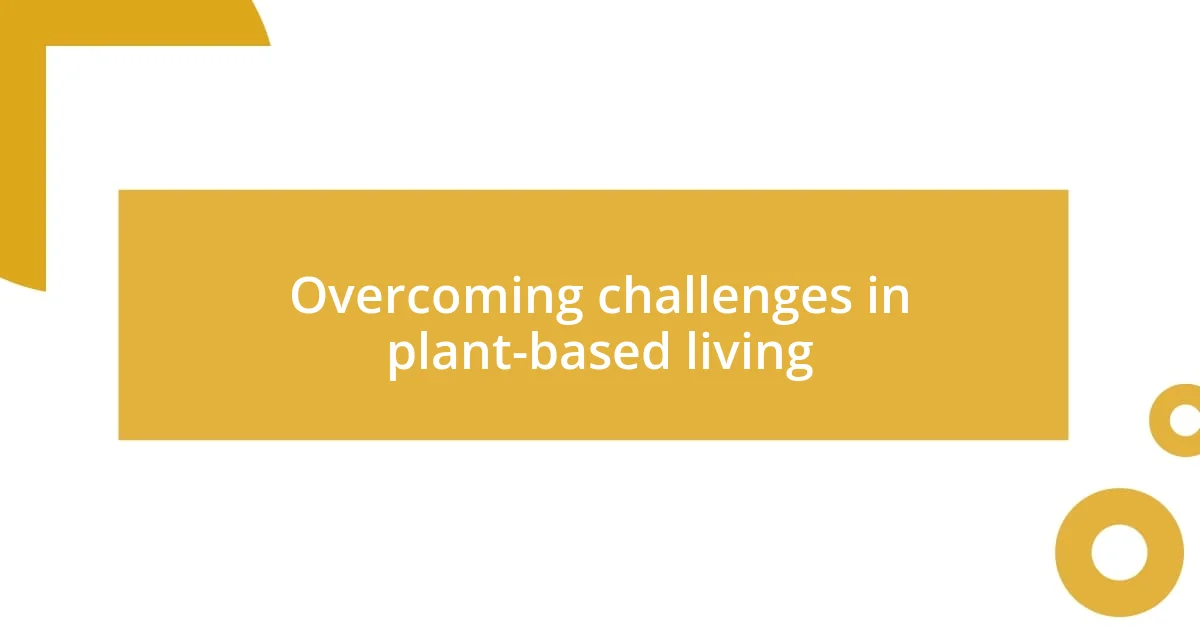
Overcoming challenges in plant-based living
There’s no sugarcoating it: transitioning to a plant-based diet can come with its own set of challenges. I fondly recall the first time I went to a restaurant with friends after I made the switch. I felt like I was navigating a culinary minefield, scanning menus for options while everyone else ordered their go-to favorites. Over time, I learned to communicate my dietary preferences and even discovered a few local spots that take pride in their plant-based offerings. It hit me then just how important it is to advocate for my food choices in social settings. Have you ever faced a similar situation?
When it comes to meal planning, I had to find a rhythm that worked for me. Initially, I was overwhelmed by the sheer number of ingredients and recipes available. I remember trying to whip up a gourmet vegan dish only to end up with a mountain of ingredients and a chaotic kitchen. Now, I prefer to keep things simple, with staples like lentils, quinoa, and seasonal veggies at my fingertips. This way, I can throw together a nourishing meal without the stress. Reflecting on it, I appreciate how embracing simplicity has been a way to regain my confidence in the kitchen.
I also want to address the occasional cravings I experience. There are moments when I think back to my favorite cheesy pasta or a slice of pepperoni pizza. In those instances, instead of feeling deprived, I’ve learned to be creative and find satisfying plant-based alternatives. For example, I’ve crafted a surprisingly delicious cashew cheese that satisfies my creaminess craving. It’s an opportunity to explore and experiment, allowing my taste buds to enjoy new flavors while also honoring my health goals. Have you tried cooking with new ingredients or experimenting in the kitchen? I’ve found that this exploration makes the journey exciting!














